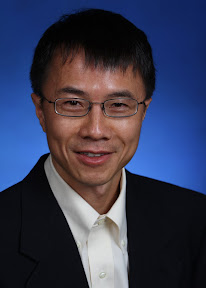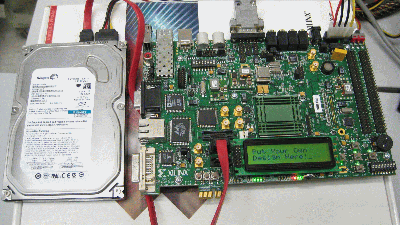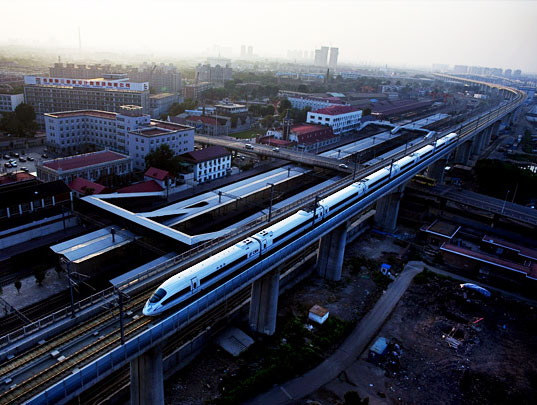
Qi Lu believes he has a "duty" to make search "more competitive and healthy" Brian Smale
Qi Lu has had more than his fill of losing to Google. For a decade, the technologist led development of Yahoo!'s Internet search technology and watched Google eclipse his company to become the Internet's brightest star. He left Yahoo in August with vague plans to start a company or return to his native China. Then Microsoft CEO Steve Ballmer came calling. He wanted Lu to consider taking over Microsoft's online operations and lead the charge against Google one more time. Ballmer promised the company was willing to invest vast resources to compete, even if it took years to pay off. "The more I thought about it, the more it seemed like a duty," says Lu, during an interview at the software giant's Redmond (Wash.) headquarters on a balmy May day. "There's a chance—a genuine chance—that we can make the search landscape a whole lot more competitive and healthy."
He may be one of the few people who believe that. But Microsoft is giving Lu more backup than he's ever had before. On May 28, the company was set to unveil an ambitious new search offering called Bing. Instead of just finding promising Web links, the site is designed to help consumers more easily make complex decisions—like what car to buy or where to go on vacation. The goal is to create a loyal base of fans who routinely use Bing for certain types of queries, rather than default to Google. To support the launch, Microsoft is gearing up its biggest search marketing blitz ever, one that could run as much as $100 million. "We're going [to show] consumers that the two guys that really care about helping you navigate the Internet are us and Google," says Ballmer "This will be the first time we will step out and say, 'We're not just sort of a general online player. We're really a player in search.' "
The stakes are high. Microsoft was slow to recognize the importance of search, only starting to build its own technology in 2003. Since then, the effort has contributed to barrels of red ink in the company's Internet business, including more than $3.5 billion in losses in the past three years. Yet Microsoft has only lost ground with its Live Search, dropping to just 8% of U.S. searches, while Google has grown to 64%. Microsoft has missed out on billions in potential revenues that might have goosed its stock, which is stuck at the same level it hit in 1998. Worse, Google is using its dominance in search to attack Microsoft's most lucrative businesses—including its Windows operating system and Office suite of business software.
Most search experts believe Lu (whose name is pronounced CHEE-loo) will struggle to do much better against Google this time. The search kingpin is refining its own technology all the time, and the data it gathers from handling almost two-thirds of people's queries give it deep insight into how they react to various search alternatives. "Microsoft is making some nice changes, but [there are] no game changers," says Danny Sullivan, editor in chief of the blog Search Engine Land who has been briefed on Microsoft's new site. "I still don't think Microsoft fully realizes how far behind Google they are."
Lu and other Microsoft executives argue they have an opening few experts see. The company's extensive research has turned up a surprising vulnerability at Google: While Web surfers may say they're happy with search technology, the data show they don't find what they're after almost half the time. Microsoft has designed the new search offering to remove the roadblocks. One example: Microsoft researchers found that 25% of clicks on search pages involve going back to the previous page, suggesting a frustrated search. So Microsoft developed a feature to avoid the wasted effort: When users hover over a Web link without clicking, Microsoft's computers generate a pop-up summary of the link.
Lu and his team have also designed a pane on the left third of the search page that generates a "table of contents" for each search. Entering "U2" brings up categories such as "songs," "tickets," and "biography," while a search for "Honda Accord" offers to lead you to "used," "reviews," and "specs." "For anything beyond finding a Web site—say, finding a person, buying a product, finding a relationship—today's search experience is not compelling," says Lu.
The marketing blitz will hit a similar note. In one TV spot, Microsoft will poke fun at Google by comparing its search to a bad relationship where your significant other takes too long to respond to questions and then gives the wrong answers three out of four times. Microsoft has also spent hundreds of millions on distribution deals that will make Bing the default search engine on Hewlett-Packard (HPQ) and Dell (DELL) PCs and Verizon phones.
LOVING THE 19-HOUR DAY
Google is certainly paying attention. The company has been adding a number of new features to its own search engine in recent months. And at a press event on May 12, Google unveiled an option to open a new left-pane feature that resembles Microsoft's technology. Marissa Mayer, vice-president for search products and user experience, declined to comment on Microsoft specifically, but says, "Search is really in its infancy. We're just really getting started."
Lu, 47, has been as involved as anyone in the technology's history. After a brief stint at IBM, he helped meld three Yahoo acquisitions to launch its first search offering in the late 1990s and later oversaw development of the technology that lets Yahoo make money by placing ads alongside search results. Along the way, he earned a reputation for having both technical chops and relentless work habits. He wakes at 3:00 a.m. most days, takes a five-mile run, and often works until 10:00 p.m. "It doesn't feel long because I love every day," says Lu, who is married with two children.
These qualities made him something of an institution at Yahoo, where he constantly pressed for management to pour more dollars into building the technology infrastructure necessary to keep pace in search. In the end, sources say he lost faith in the company's ability to do so, and left. Former Yahoo engineer Amit Kumar says Lu was "universally well liked" and at his going-away party T-shirts were handed out that read: "I worked with Qi. Did you?"
A FATEFUL ENCOUNTER
Lu has faced tough challenges since he was a boy. Facing persecution during China's Cultural Revolution, his parents sent him from their Shanghai home to live with his grandfather in a tiny town in Jiangsu province, five hours away. Lu lived without electricity or plumbing, and was so poor that meat was a once-a-year luxury. His first two choices to escape poverty were closed off: His slight build left him short of government weight mandates for coveted ship-building jobs, and his eyesight was too poor to pass requirements for becoming a physicist.
That left computer science, which he hoped might help him land a job in a radio factory. Instead, after earning his master's degree, he was assigned to a $10 a month teaching job at Fudan University in Shanghai. One weekend a rainstorm prevented his weekly bike ride home to see his parents, so he was in his dorm room when a student knocked and pleaded with him to attend a talk by Carnegie Mellon professor Edmund M. Clark since only a few students had showed up. Impressed with Lu's questions, Clark asked to see his research papers and then offered him a scholarship to earn his PhD—even waiving the $45 application fee that Lu says he could never have come up with.
Even fans question whether he has the business acumen to be Microsoft's savior. One former Yahoo executive thinks Lu's main allure to Microsoft is that he'd be the perfect person to integrate Yahoo's search operation if Ballmer ever manages to gain control of the business, which Microsoft bid for last year. Ballmer disputes this. "Qi is here because he's absolutely the best guy on the planet to run a search business."
When Lu arrived in December as president of Microsoft's Online Services Division, he inherited a division that began planning its search offensive in mid-2007. That's when Ballmer asked Susan Athey, a young Harvard economist who studies auctions, to help rethink the search effort. In an initial session in Redmond, Athey quelled fears that there may not be room for a second player in the business, but only if Microsoft got much larger and learned to innovate much faster. Just buying Yahoo, as Ballmer was trying to do, wouldn't be enough. Later hired as Microsoft's chief economist, Athey led the research effort that uncovered consumers' frequent troubles with search. "There's no reason Microsoft couldn't catch Google," she says.
Since acccepting, Lu's priorities are to set long-term strategy while tightening up operations. One of his mantras: "Have your head above the clouds but your feet on the ground." He arrives at meetings with stacks of documents, many with notes jotted down in the margins, and requires that a summary be written up afterwards. He is also pushing through changes so that the search group can forecast revenues on a daily rather than monthly basis, to react more quickly to what's working.
Still, he thinks Microsoft's real strength is its willingness to lay out a multi-year plan to gain on Google. Lu's group is working more closely with Microsoft Research so new technologies can be integrated into search. Soon, people with mobile phones will be able to speak search terms, rather than type them. Eventually, Lu says those looking for answers will be able to push beyond the limits of typing a few words in a rectangular box. "This is just the first step in a long journey," he says.
Qi Lu ฟังชื่อดูก็รู้ว่าเป็นจีน ปัจจุบันอายุ 47 ขวบ อดีตเคยเป็นหัวหน้าฝ่าย search technology ให้กับ yahoo เขาเป็นลูกหม้อของยาฮูมาตั้งแต่ยุค 1998 ช่วงหลังเขาเริ่มท้อแท้กับอนาคตของบริษัทเลยวางแผนจะพับเสื่อกลับเมืองจีน ระหว่างที่กำลังลังเลอยู่นั้น เขาก็ได้รับโทรศัพท์สายหนึ่งจากผู้ชายที่ชื่อว่าสตีฟ บัลเมอร์ และเรื่องทุกอย่างก็เริ่มต้นขึ้น
ย้อนประวัติชีวิตของ Qi Lu กันสักหน่อย เขาเกิดในเมืองจีน ที่เซี่ยงไฮ้ในช่วงปฏิวัติวัฒนธรรมพอดี พ่อแม่เลยส่งไปอยู่ชนบทกับญาติในมณฑลเจียงสูเพื่อความปลอดภัย เขาโตขึ้นในสภาพแวดล้อมที่ไม่มีไฟฟ้าและน้ำประปา อาชีพในฝันของเขามีสองอย่าง อย่างแรกคือต่อเรือแต่ดันตัวเล็กเกิน อย่างที่สองคือนักฟิสิกส์แต่ก็ดันมีปัญหาเรื่องสายตา
Qi Lu จึงหันมาเรียนคอมพิวเตอร์เพื่อหวังจะได้งานในโรงงานผลิตวิทยุ แต่เมื่อเรียนจบปริญญาโท เขากลับได้งานเป็นอาจารย์ในเซี่ยงไฮ้ซึ่งได้เงินเดือนแค่ 10 ดอลลาร์สหรัฐ ชีวิตดูจะราบเรียบเป็นอย่างนี้ไปจนตาย แต่คืนหนึ่งในวันที่ฝนตก เขากลับบ้านไปเยี่ยมพ่อแม่ไม่ได้จึงต้องอยู่ในหอพักอาจารย์ ก็มีเสียงเคาะประตูดังขึ้นมา
นักเรียนคนหนึ่งเดินมาขอให้เขาเข้าฟังการบรรยายของศาสตราจารย์จาก Carnegie Mellon เพราะคนเข้าน้อยกลัวโหรงเหรง Qi Lu ไม่มีทางเลือก วันนั้นเป็นการบรรยายของ Edmund M. Clark (Wikipedia) ปรากฎว่า Qi Lu ถามคำถามที่โดดเด่นโดนใจศาสตราจารย์มากถึงขนาดเสนอทุนเรียนต่อเอกให้ Qi Lu รวมถึงจ่ายค่าสมัคร 45 ดอลลาร์ที่ Qi Lu ไม่มีจ่ายให้ด้วย

ภาพ Qi Lu จากเว็บไซต์ไมโครซอฟท์
ชีวิตของ Qi Lu หลังจากนั้นก็พลิกผัน เขาเริ่มงานที่ IBM ก่อนย้ายมายาฮู และเป็นเจ้าแห่ง search engine ภายในยาฮูในที่สุด เขามีชื่อเสียงทั้งในแง่ความสามารถทางเทคโนโลยีและการทำงานหนักวันละ 19 ชม. (ตื่นตีสามมาวิ่ง และทำงานจนถึง 4 ทุ่ม) ลูกน้องและพนักงานในยาฮูเคารพในตัว Qi Lu มากถึงขนาดมีเสื้อยืดที่เขียนว่า “I worked with Qi. Did you?”
Qi Lu พบปัญหาในการของบประมาณจากฝ่ายบริหารของยาฮูเพื่อมาผลักดันด้าน search ให้แข่งกับกูเกิลได้ แหล่งข่าวรายงานว่าเขาหมดศรัทธากับบริษัท และหลังจากบัลเมอร์มาทาบทาม เขาลาออกจากยาฮูเมื่อเดือนสิงหาคมปีที่แล้ว และเข้าทำงานกับไมโครซอฟท์ในเดือนธันวาคม ตำแหน่งปัจจุบันคือ ประธานฝ่าย Online Services Division
ในระหว่างที่ Qi Lu ปรับปรุงฝ่าย search technology บัลเมอร์ก็ได้ให้ Susan Athey นักเศรษฐศาสตร์วิเคราะห์ว่าไมโครซอฟท์ยังมีโอกาสในตลาดนี้หรือเปล่า? ตอนแรก Athey เกรงว่าจะไม่มีที่ยืนสำหรับเบอร์สองในตลาด แต่หลังจากวิจัยพฤติกรรมผู้ใช้ search engine ว่ายังไม่พอใจกับการทำงานของ search engine ในปัจจุบัน เธอก็มั่นใจว่า “ไม่มีเหตุผลอะไรที่ไมโครซอฟท์จะสู้กูเกิลไม่ได้”
Qi Lu กำลังวางแผนระยะยาวสำหรับยุทธศาสตร์ด้าน search engine ให้กับไมโครซอฟท์ เขามองว่าจุดแข็งของไมโครซอฟท์คือความมุ่งมั่นที่จะสู้ในเกมระยะยาวกับกู เกิล ในอนาคตไมโครซอฟท์จะมุ่งไปยังวิธีการค้นหาแบบอื่นๆ เช่น ค้นหาด้วยเสียง หรือ ผ่านมือถือ Qi Lu ทิ้งท้ายว่า “Bing ยังเป็นแค่จุดเริ่มต้นเท่านั้น”
ที่มา - BusinessWeek,blognone
ดูเพิ่ม - คำแถลงข่าวรับตำแหน่งของ Qi Lu ที่ไมโครซอฟท์








